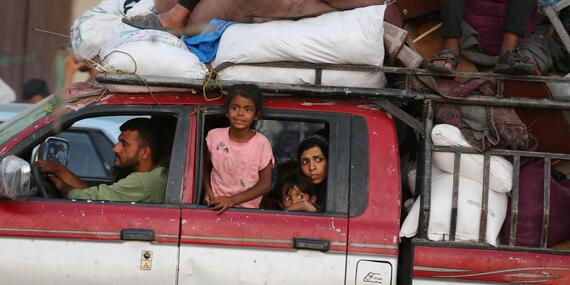Today's top news: Occupied Palestinian Territory, Ukraine, Qatar, Protection of Civilians week

Occupied Palestinian Territory
Israeli bombardment continues to be reported across much of Gaza, as well as ground incursions and heavy fighting, especially in eastern Rafah in the south and Jabaliya in the north.
More than 900,000 people – about 40 per cent of Gaza’s population – have been displaced over the past two weeks – including some 812,000 people from Rafah and more than 100,000 others in northern Gaza.
To date, more than 75 per cent of the Gaza Strip – some 285 square kilometres – is under evacuation orders, amid escalating hostilities. Under international humanitarian law, civilians – whether they move or stay – must be protected. Wherever they are in Gaza, their essential needs, including food, shelter, water and health, must be met.
As the large-scale displacement of civilians in Gaza continues, hundreds of thousands of people are experiencing extremely poor living conditions.
Humanitarian partners working to provide shelter to people in Gaza report that there are no tents and very few shelter items left for distribution.
OCHA says people displaced from Rafah are currently seeking shelter in Khan Younis and Deir al Balah on any open land available, including access roads and agricultural land, as well as in damaged buildings that have not been structurally assessed.
Meanwhile, humanitarian colleagues working to provide water, sanitation and hygiene support in Gaza say there are shortages of hygiene kits and water containers for households to collect and store water, which are especially critical in light of ongoing displacement.
As more people move to areas lacking basic necessities such as water and food, our partners trying to maintain health care in Gaza are bracing for a further surge in communicable diseases and malnutrition.
The escalating fighting in Rafah and in northern Gaza has severely disrupted nutrition services, according to colleagues working on that part of the response. In Rafah, the World Food Programme’s partners have lost access to more than 100 distribution points for malnutrition prevention activities.
Meanwhile, critical health facilities have become inaccessible due to their presence within or near areas subject to evacuation orders, according to health partners. In Rafah, more than 20 medical points, four hospitals and four primary health care centres have been affected by the evacuation orders.
In northern Gaza, 16 medical points have been affected, as well as five primary health care centres and two hospitals – Al Awda and Kamal Adwan.
In a social media post yesterday, the Director-General of the World Health Organization, Dr. Tedros, said reports of intense hostilities in the vicinity of Kamal Adwan – coupled with an influx of injured patients – were deeply worrisome, given the facility’s limited ability to provide care.
Ukraine
Local authorities and aid workers say escalating hostilities in Ukraine's Kharkiv Region have led to multiple civilian deaths today and over the weekend, including children, first responders and health personnel.
Civilians were also displaced and homes, a hospital, a kindergarten and other civilian infrastructure were damaged.
Meanwhile, attacks in eastern and southern Ukraine over the weekend caused scores of civilian casualties and damage to homes and civilian infrastructure, according to authorities and humanitarian workers there.
Civilians continue to be displaced from border and front-line communities in the Kharkiv region that are subject to evacuation mandates. Aid organizations have registered nearly 8,500 people at the transit centre in Kharkiv City, where they are now receiving humanitarian assistance. This includes food, clothes, bedding, hygiene items, medicines and health services, legal counselling and psychological support.
Aid workers in other parts of Ukraine also continue their efforts to support people affected by ongoing hostilities.
Qatar
The Under-Secretary-General for Humanitarian Affairs, Martin Griffiths, is in Doha to hold talks with senior Government officials on ways to bolster the partnership between Qatar and OCHA and to discuss ways to ensure the humanitarian system is better prepared to address crises.
Today, Griffiths spoke at the Global Security Forum, where he noted that strategic competition has been the hidden – and not so hidden – hand behind the outbreak of seemingly endless conflicts. But he said he has hope – because in the fiercest conflicts, humanitarian diplomacy has appealed to the common good, pointing to the example of the Black Sea Initiative. “Humanity will outlive the decisions of bad leaders,” Griffiths said.
Protection of Civilians week
The seventh edition of the Protection of Civilians week starts today with 17 side events to amplify the voices of civilians affected by armed conflict.
This year also marks the 25th anniversary of the Security Council’s consideration of the protection of civilians as an item on its agenda, as well as the 75th anniversary of the Geneva Convention.
Tomorrow, the Security Council will have an open debate on the issue, with a briefer from OCHA set to deliver remarks. This meeting will be webcast starting at 10:00 a.m. New York time.
Protection of Civilians Week is an OCHA-led initiative – with Switzerland, the Center for Civilians in Conflict and the International Rescue Committee as co-coordinators.
